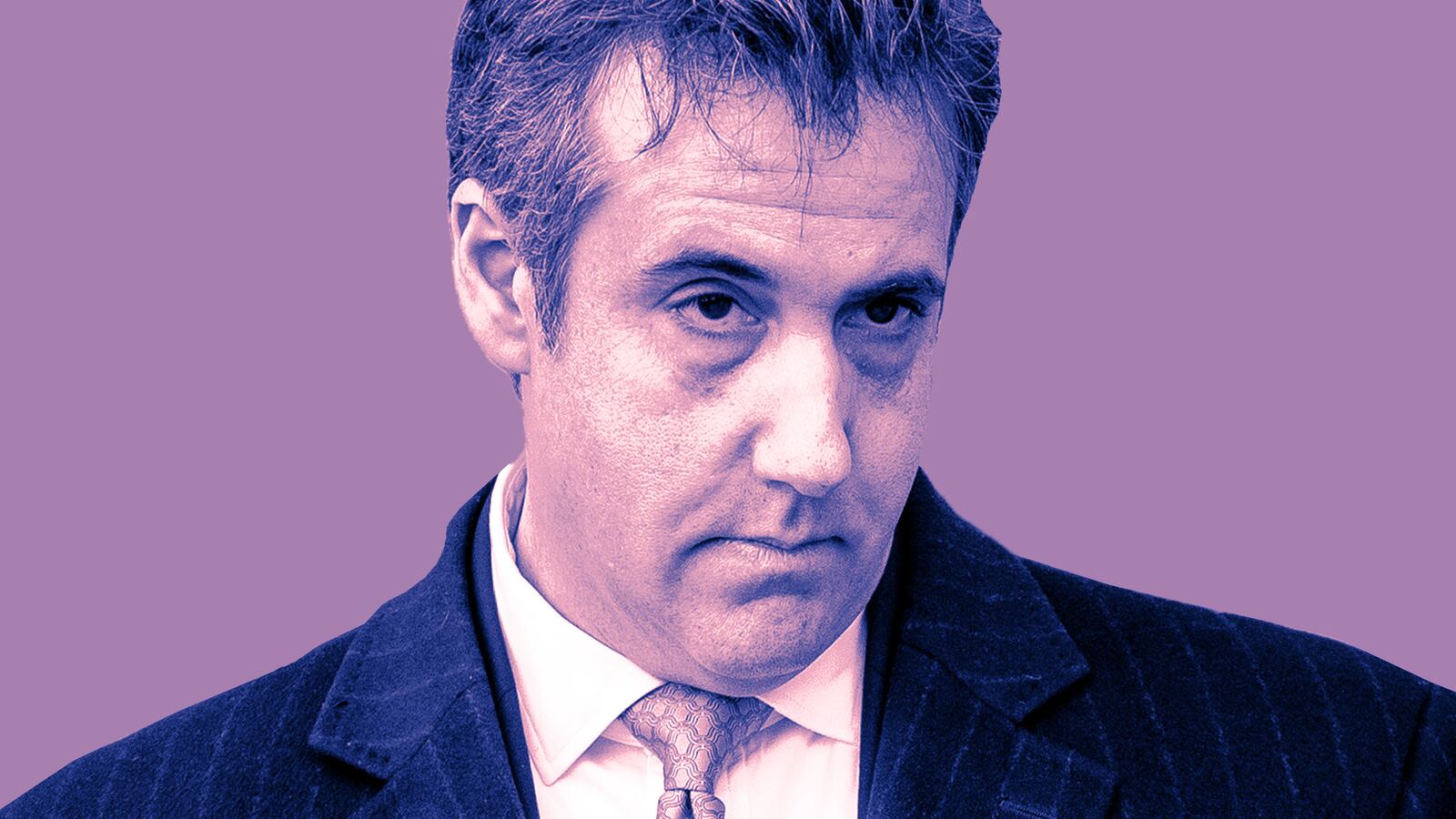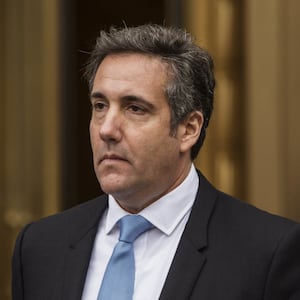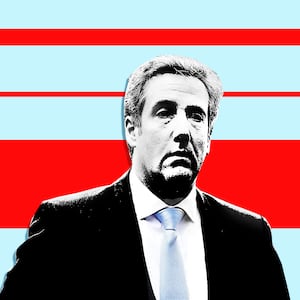The Donald made me do it.
That was the essence of Michael Cohen’s statement at his sentencing in Manhattan federal court as his wife, daughter, son, parents, sisters, brother, and in-laws sat in tears behind him.
To hear Cohen tell it to the judge in a 20th-floor courtroom on Wednesday afternoon,Trump's malevolent influence compelled him to evade taxes, make false statements to a bank, lie to Congress, and violate campaign-finance laws.
Cohen declared himself finally liberated from “moral and personal incarceration” at the hands of the Orange One. He could again “become the person I really am.”
“This may seem hard to believe,” Cohen said. “Today is the day I’m getting my freedom back.”
Hard to believe indeed.
Cohen had been years from even meeting Trump when he became a personal injury lawyer representing folks in Brooklyn who filed dubious personal injury claims resulting from suspect car accidents, a hustle then so common in the Brighton Beach section that detectives took to calling an apartment building there “No Fault Towers.”
Cohen’s law practice had also included cashing a $350,000 check made out to him by a Russian hockey player and extortion victim and intended for the girlfriend of an alleged Russian mobster.
As was first reported by BuzzFeed, the six-figure sum in 1999 became the subject of a lawsuit. Cohen was deposed under oath about the check in 2007.
Q: Mr. Cohen, do you recognize the signature on the check?
A: No.
Q: You cannot say whether that is or is not your signature?
A: You asked me about the signature. There was two signatures on this check.
Q: Do you recognize the endorsing signature as your signature?
A: Yes. It could be.
Q: Mr. Cohen, let me ask you, what are some of the possible reasons that somebody would have sent a check to your trust account in 1999?
A: I have no idea… I don't know what this is about. It is from 1999. I have no recollection.
Q: What would be the possible reasons for your receiving a check addressed to your trust account in 1999?
A: I don’t understand the question.
The deposition took place the same year that Cohen was beginning his dealings with Trump, before even the most diabolical influence would have had time to lead anybody astray who was not already well on the way. The transcript is pure Cohen.
And Cohen was by then big into the taxi business, thanks not to Trump but to his father-in-law Fima Shusterman. Cohen borrowed big to buy millions in medallions in the days before Uber. He then used them as collateral to buy more medallions, on at least one occasion failing to tell the bank that he had already borrowed against them.
In the meantime, Cohen and his partners in the taxi business charged drivers $100 per 12-hour shift to lease a cab. Trump had nothing to do with Cohen stashing a fortune of those cash payments without declaring it to the IRS.
In unrelated business dealings, the father-in-law was charged with engaging in more than $5 million in money transfers without making the required declarations back in 1993. He had spared himself from actual incarceration by becoming a cooperating witness, an arrangement similar to one Cohen might have managed.
But the Art of The Agreement—distinct from the Art of The Deal—as practiced by prosecutors in the Southern District of New York begins with the cooperating witness owning up to every crime he or she ever committed.
Cohen’s lawyer, Guy Petrillo, told the court at the sentencing that his client had decided not to enter into a cooperating agreement “for personal reasons.” Petrillo added that Cohen did not wish to prolong his family's suffering in the media spotlight by extending his journey through the criminal justice system.
Cohen sought to strike a noble note when it came his turn to speak.
“I do not need a cooperation agreement to be in place to do the right thing,” Cohen said.
He choked up when he declared, “I will make it my life’s work to make it right and be the best person I can be.”
Right.
If that were true, you might think Cohen would want to begin by owning up to everything he had done, cooperation agreement or no.
His “personal reasons” for failing to do so may include not wanting to confess to crimes that could lead him to lose more ill-gotten gains, a lively concern given the sorry state of the taxi industry, He might also be worried how some of his shadier business associates might respond if they feared he was giving them up. And he could be worried that he might implicate people who are close to him.
At the very least, a full and truthful accounting would make clear that Cohen was a bullying creep driven by greed and ambition long before he went to work for Trump and became a fixer who could not fix anything. The unlikely explanation that he offered in court for not having entered into a cooperation agreement raised the possibility that he was his same lying self even as he apologized for having lied.
On close examination, the only significant change in Cohen may be that he got caught. He seemed at his worst even as he pledged to be the best he can be, a promise delivered with such apparent feeling that he may have almost convinced himself.
He almost certainly persuaded his family. His twentysomething daughter Samantha has apparently suffered a leg injury of some kind, but had entered the courtroom at his side with the assistance of a pricey-looking crutch with shearling cushioning. She was accorded a folding chair placed next to the first of the spectator benches, in front of the wheelchair where her paternal grandfather was parked.
“I don't want to sit there,” she said in the voice of a character from Gossip Girl. “I can't see anything.”
A court security officer broke with precedent and admitted her to the well, allowing her to sit in a cushioned chair behind the defense table. A clerk called for all to rise.
“USA versus Cohen,” he announced.
Judge William Pauley took the bench and the proceedings began. Samantha quickly became less a caricature of a spoiled rich kid and much more like a blameless and decent daughter who loves her dad. Only the hardest-hearted would not have felt due sympathy for her as she dabbed her eyes with white tissues as her father was sentenced to three years in prison.
The rest of the family was among the spectators. Cohen’s wife, Laura, was also in tears and slumped against her crying son, Jake. Cohen’s mother sat next to his father, and both looked as distraught as might be expected. The father had written a genuinely stirring letter to the courts.
“I am Maurice Cohen, father of Michael Cohen,” the letter begins. “I was born in Poland, in August of 1935. Shortly after turning 4-years-old, the world around me turned into an inferno and my life was turned upside down. I survived bombings, target shooting, hunger and disease, gulags of Siberia, and persecution. Ultimately, my family and I were blessed to leave Europe and go to Canada.”
He had attended medical school in Toronto and moved to New York, opening a private practice in Brooklyn.
“I hoped to do some good, one person at a time, and possibly justify why the Lord decided to spare me.”
The letter goes on to describe “my beloved son” as “a person with a heart and soul, always willing to help.”
“So please where Michael is, let me be with him, and where he goes, let me go,” the letter concludes. “He is the oxygen in the air that I breathe. I am 83-years-old, ravaged by time.”
The father now sat in the 20th floor courtroom and listened to the judge set March 6, 2019 as the date Michael Cohen is to surrender. Pauley at least agreed to recommend incarceration at the Otisville Correctional Facility, just 70 miles northwest of New York City.
“This matter is concluded,” the judge then said. “Have a good afternoon.”
The judge left the bench and the father summoned the strength to rise from the wheelchair and take three unsteady steps up to to the rail. He spoke softly to his son and embraced him.
The daughter reached for her cane and left two crumpled white tissues on the seat she had insisted upon. Michael Cohen retrieved them and exited at her side, joined by the rest of the family.
As they passed from the courtroom itself to the foyer, Cohen dutifully deposited the tissues in a trash can, as if he really were the responsible citizen he had just said that he is, as if he were not just a crook and a liar who tried to blame it on Trump. He at any rate has what seems to be a very nice family.
Outside, Cohen climbed into the back of a black Toyota with the category of license plate used by Uber and Lyft and other such services that have cratered the taxi medallion market and perhaps left him in too much of a financial bind to tell the truth. The admissions he had made already cost him nearly $2 million in fines and restitution.
Whatever his “personal reasons” for not fully cooperating, Cohen will have three years to ponder the difference between the Art of the Deal and the Art of the Agreement.
He will also have plenty of time to ponder the sordid silliness of claiming the Donald made me do it.







